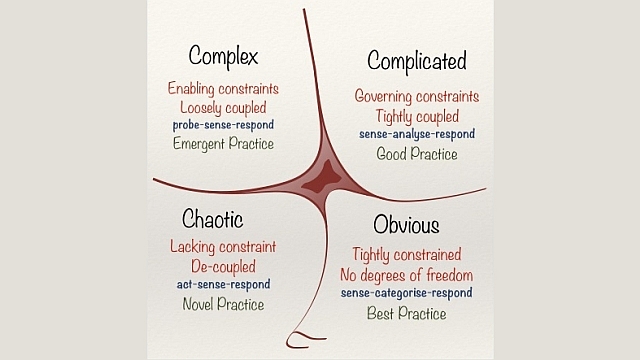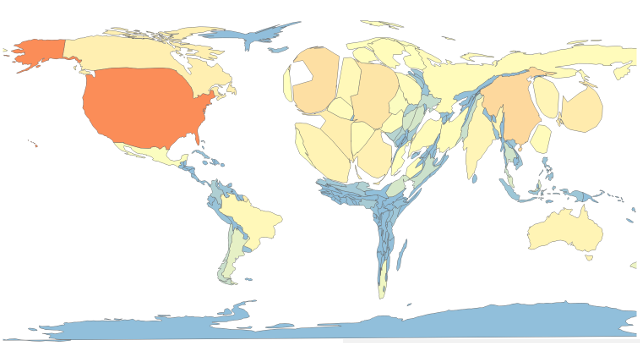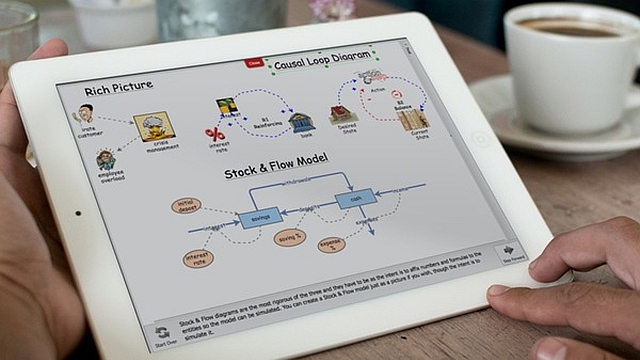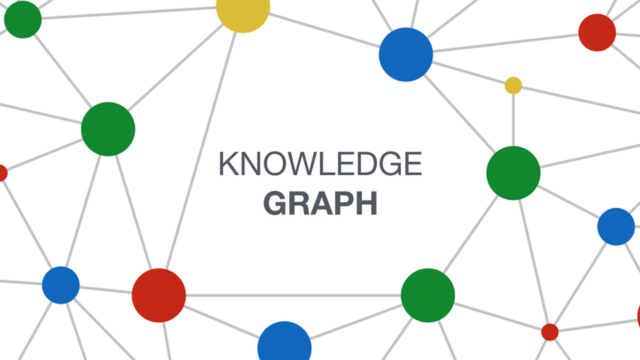
Knowledge, complexity, and systems [RealKM Connect introductory series]
This is part 2 of a series of articles presenting key points from Stephen Bounds’ presentation1 to a RealKM Connect introductory seminar in November 20162.
Effective knowledge management requires us to understand that systems exist at all levels and in all scales of organisations, and that these systems determine how we can intervene to make positive change.
The Cynefin framework, developed by Dave Snowden and his team at IBM in the early 2000s, is a conceptual framework used to help managers, policy-makers, and others make decisions. Cynefin is a Welsh word for habitat, and offers five decision-making domains: simple (now called obvious), complicated, complex, chaotic, and disorder.
In discussing the Cynefin framework, Snowden makes a pivotal point in relation to knowledge3:
It is important to note here that by known and know-able we do not refer to the knowledge of individuals. Rather, we refer to things that are known to society or the organization, whichever collective identity is of interest at the time. If I look up my organization’s policy on travel to Iceland, I may not know what I will find there, or even how I will find it, but I know I can find something, because I know it is known to the organization. If I want to know how fish sleep, I may not know how or where to find out, but I have a hunch that somebody knows.
Snowden was able to present an idea that encouraged managers to think beyond concepts like “I need to implement best practice” or “I need to have experts.” He got them to understand that there is a world which is not controllable and can’t tightly be managed to get predictable results. On the other hand, this idea also simplified the nature of systems; complexity doesn’t disappear here just because it’s constrained.
Complexity in human beings and in systems is ever present. It’s a matter of whether it’s currently buried beneath other constraints on the system. There’s always the potential for complexity to emerge and shake our assumptions. Political events which have surprised many in recent times (Brexit, Donald Trump, the resurgence of One Nation in Australia), and companies and industries that seemed very stable suddenly collapsing. Complexity always exists, indeed it haunts us.
Once we accept complexity and let go of the idea that systems are to be turned into machines, we move towards a model of systems as problem-solving machines rather than the source of our problems. John Boyd, a US Air Force fighter pilot and Pentagon consultant, developed a decision-making loop, the OODA model4. He examined the process by which an individual or entity makes a decision, based on the idea that you observe, orient, decide and act. This involves acting and reacting faster, how we acquire and analyse the information that we get, and how we choose to solve problems. This cycle defines how we get things done.
In the next article, we’ll consider integrating knowledge management based on these concepts.
The RealKM Connect toolbox
The purpose of the RealKM Connect membership and seminars is to develop a toolbox of evidence-based resources to support practitioners in their daily practice. The aim is that at the end of the seminars, participants will have refreshed their thinking and have new insights into existing problems and new ways of approaching them. Our objective is to build a deeper understanding of knowledge management, responsive to other disciplines, and to start evolving knowledge management practice into the future.
Header image source: Cynefin as of 1st June 2014 by Dave Snowden is licensed by CC BY-SA 3.0.
References and notes:
- Stephen Bounds is the Director and Principal Consultant at KnowQuestion, publisher of RealKM Magazine. ↩
- For a copy of the transcript please contact Amanda Surrey. ↩
- Kurtz, C.F. & Snowden, D.J. (2003). The new dynamics of strategy: Sense-making in a complex and complicated world. IBM Systems Journal 42(3): 462–483. ↩
- Greene, R. (2011). OODA and You. Power, Seduction and War: The Blog of Robert Greene. http://powerseductionandwar.com/ooda-and-you/ ↩





